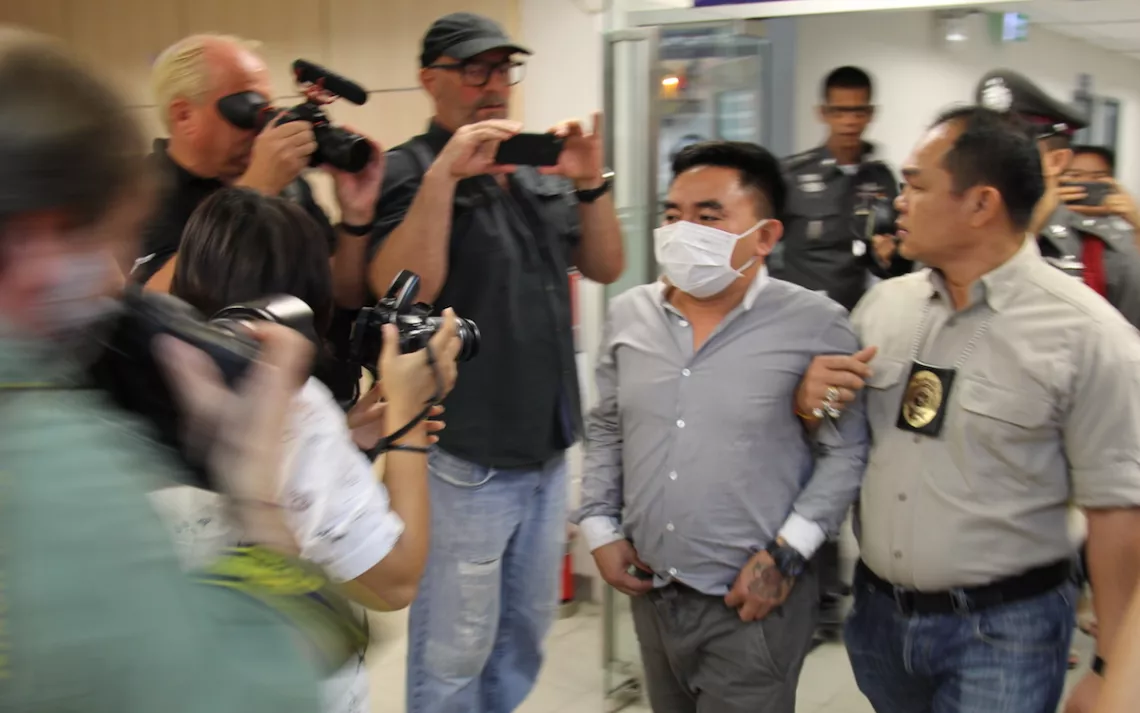Leader of Wildlife Trafficking Ring "Hydra" Arrested in Thailand
But like its namesake, "you hack off one head and another one grows back"

Photo courtesy of Freeland/+Matthew P
On January 19, Thai police arrested Bach “Boonchai” Mai, a notorious Vietnamese wildlife trafficker, for his alleged role in smuggling 14 rhino horns from Africa to Thailand. His capture was immediately hailed as a major victory in the fight against the illegal wildlife trade. “I can’t think of anything in the past five years that has been this significant,” Matthew Pritchett, spokesperson for the anti-trafficking group Freeland, told the Associated Press.
But conservationists caution that it’s too early to celebrate. “This case in Thailand will be a landmark one in Southeast Asia, but it remains to be seen if it will be a positive example or a negative one,” says Chris Shepherd, executive director of Monitor, a new organization working to reduce the impact of the illegal wildlife trade.
Indeed, just a week after his detention, Bach was released on bail, leading to worries that he will skip his February trial—among other concerns. “His bail being granted may be an indication of corruption, or it may just be as simple as no one having gone to the judge to say, ‘This guy has multiple identities and passports and is a flight risk,’” says Freeland founder Steven Galster, who has been tracking Bach and his associates since 2003.
Freeland and other conservation groups have previously pointed to the central role that Bach and his brother, Bach Van Limh, play in the illegal trade of ivory, rhino horn, tigers, pangolins, and more throughout Thailand, Laos, and Vietnam. Known as Hydra, the Bach brothers’ syndicate also has ties to Africa and China. Yet they have long managed to evade detection and arrest.
That finally changed on December 2017, when customs officials at the Bangkok airport discovered rhino horns worth an estimated $1 million concealed in a Chinese citizen’s bag. Rather than seize the horns, the officials alerted the police to see if they could push the case further.
“Customs authorities in Bangkok were not just pleased with the fact that they made a seizure and identified the person carrying the rhino horn—they wanted to understand more,” says Giovanni Broussard, Southeast Asia regional coordinator of the United Nation’s Global Program for Combatting Wildlife and Forest Crime. “It’s shows a good change of mentality in the way in which Thai authorities work.”
Together, Thai customs and police officials employed a method called “controlled delivery,” in which illegal goods are allowed to continue their journey in order to turn up further criminals. The Chinese courier delivered the horns to one Nikorn Wongprajan—a corrupt government official and known member of the Hydra syndicate, Galster says—who in turn led investigators to another Chinese citizen and to Bach Van Hoa, a relative of Bach’s. The men were arrested, and Thai police were able to gather the evidence they needed to also issue a warrant for Bach.
Bach is the highest-level actor arrested to date in Thailand for wildlife crime, Galster says. But his breakthrough arrest is just the first step in disrupting the deadly trade.
For starters, should Bach show up for his trial, a conviction and satisfactory sentence are by no means guaranteed. Like many other Southeast Asian countries, Shepherd says, Thai wildlife law is rife with loopholes and penalties are generally weak. Unless additional charges are tacked on for money laundering and customs violations, Bach faces just four years in prison and a laughable $1,300 fine.
And even if he is given the maximum penalty, his brother and other associates are still on the loose and can easily fill his role. “The group’s code name, Hydra, is quite appropriate: You hack off one head and another one grows back,” says Julian Rademeyer, project leader at TRAFFIC, a global wildlife-trade-monitoring organization. “These networks are extremely adaptable, highly resilient, and a lot more effective at doing their business than law enforcement is.”
Dispersed, multiplayer structures are typical of many organized crime groups today, adds retired detective John Sellar, former chief of enforcement for the Convention on the International Trade in Endangered Species. “Locking up the Al Capones and John Gottis may give you a bit of breathing space, but there’s always someone else there to take their place,” he says. But what authorities can do, he continues, is hurt criminals’ bottom lines: “If you make things difficult for organized crime groups, on most occasions they’ll move on to something else.” Galster agrees, saying that seizing assets and freezing bank accounts is a necessary next step for breaking up syndicates like Hydra, which presumably has ample funds to continue its operations, even if Bach is temporarily removed.
International cooperation will also be key to maintaining momentum, Broussard says. If Thailand clamps down on wildlife criminals but neighboring Vietnam and Laos do not, overall gains will be undermined. “We’re really hoping the Lao police will now start to actually work with the Thai police to see whether there are leads they can follow in Laos,” Broussard says. “A network like this cannot be addressed only from one angle."
Disclaimers aside, Shepherd says, a Bach conviction would still be a very welcome development—and even more so if it’s followed by similar successes: “Removing well-established criminals is key,” he says. “It’s easier to uproot a newly planted tree than it is to uproot one that has been growing in the same spot for many years.”
 The Magazine of The Sierra Club
The Magazine of The Sierra Club